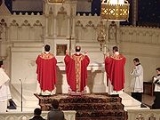
Missa Sicca
Encyclopedia
The Missa Sicca was a common form of devotion used in the medieval Roman Catholic Church
for funerals or marriages which were served in the afternoon, when a real Mass (liturgy)
could not be said. It consisted of all the Mass except the Offertory
, Consecration
and Communion
(Durandus
, "Rationale", IV, i, 23).
The missa nautica and missa venatoria, said at sea in rough weather and for hunters in a hurry, were kinds of dry Masses.
In some monasteries
each priest
was obliged to say a dry Mass after the real (conventual) Mass. Cardinal Giovanni Bona
(Rerum liturg. libr. duo, I, xv) argues against the practice of saying dry Masses. Following the reform of Pope Pius V
it gradually disappeared.
, s.v. Missa Sicca Sec. D, ¶ 6.
Roman Catholic Church
The Catholic Church, also known as the Roman Catholic Church, is the world's largest Christian church, with over a billion members. Led by the Pope, it defines its mission as spreading the gospel of Jesus Christ, administering the sacraments and exercising charity...
for funerals or marriages which were served in the afternoon, when a real Mass (liturgy)
Mass (liturgy)
"Mass" is one of the names by which the sacrament of the Eucharist is called in the Roman Catholic Church: others are "Eucharist", the "Lord's Supper", the "Breaking of Bread", the "Eucharistic assembly ", the "memorial of the Lord's Passion and Resurrection", the "Holy Sacrifice", the "Holy and...
could not be said. It consisted of all the Mass except the Offertory
Offertory
The Offertory is the portion of a Eucharistic service when bread and wine are brought to the altar. The offertory exists in many liturgical Christian denominations, though the Eucharistic theology varies among celebrations conducted by these denominations....
, Consecration
Consecration
Consecration is the solemn dedication to a special purpose or service, usually religious. The word "consecration" literally means "to associate with the sacred". Persons, places, or things can be consecrated, and the term is used in various ways by different groups...
and Communion
Eucharist
The Eucharist , also called Holy Communion, the Sacrament of the Altar, the Blessed Sacrament, the Lord's Supper, and other names, is a Christian sacrament or ordinance...
(Durandus
Guillaume Durand
Guillaume Durand, or William Durand, , also known as Durandus, Duranti or Durantis, from the Italian form of Durandi filius, as he sometimes signed himself, was a French canonist and liturgical writer, and Bishop of Mende.-Life:He was born at Puimisson, near Béziers, of a noble family of Languedoc...
, "Rationale", IV, i, 23).
The missa nautica and missa venatoria, said at sea in rough weather and for hunters in a hurry, were kinds of dry Masses.
In some monasteries
Monastery
Monastery denotes the building, or complex of buildings, that houses a room reserved for prayer as well as the domestic quarters and workplace of monastics, whether monks or nuns, and whether living in community or alone .Monasteries may vary greatly in size – a small dwelling accommodating only...
each priest
Priest
A priest is a person authorized to perform the sacred rites of a religion, especially as a mediatory agent between humans and deities. They also have the authority or power to administer religious rites; in particular, rites of sacrifice to, and propitiation of, a deity or deities...
was obliged to say a dry Mass after the real (conventual) Mass. Cardinal Giovanni Bona
Giovanni Bona
Giovanni Bona was an Italian Cistercian, cardinal, liturgist and devotional author.-Biography:He was born of an old French family at Mondovì, in Piedmont, northern Italy, on 19 October, according to some 10 October, 1609...
(Rerum liturg. libr. duo, I, xv) argues against the practice of saying dry Masses. Following the reform of Pope Pius V
Pope Pius V
Pope Saint Pius V , born Antonio Ghislieri , was Pope from 1566 to 1572 and is a saint of the Catholic Church. He is chiefly notable for his role in the Council of Trent, the Counter-Reformation, and the standardization of the Roman liturgy within the Latin Church...
it gradually disappeared.
See also
- ViaticumViaticumViaticum is a term used especially in the Roman Catholic Church for the Eucharist administered, with or without anointing of the sick, to a person who is dying, and is thus a part of the last rites...
- Mass of the PresanctifiedMass of the PresanctifiedThe Mass of the Presanctified is a Christian liturgy traditionally celebrated on Good Friday in which the Sacrifice of Calvary is not re-presented, and in which Holy Communion is given from an oblation consecrated at a previous Mass which had been reserved...
, s.v. Missa Sicca Sec. D, ¶ 6.

